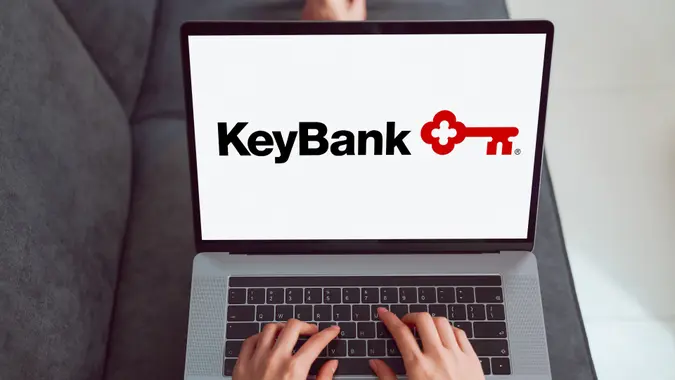Fidelity Investments Review 2023: Established Broker With Investment Options for Everyone
Commitment to Our Readers
GOBankingRates' editorial team is committed to bringing you unbiased reviews and information. We use data-driven methodologies to evaluate financial products and services - our reviews and ratings are not influenced by advertisers. You can read more about our editorial guidelines and our products and services review methodology.

20 Years
Helping You Live Richer

Reviewed
by Experts

Trusted by
Millions of Readers
GOBankingRates Score
-
Fees
4.8
-
Promotions
4.6
-
Customer Service
4.8
-
Mobile Experience
4.9
Pros
- Trading fees from $0
- No trade or account minimums
- No fees for most account services, including transfers out
- 200 physical branches across America
Cons
- Hard for many investors to earn the free trades promotion
- User interface can be a bit overwhelming
Fidelity Overview
Fidelity gained popularity in the 1980s on the strength of its mutual fund lineup, which included star managers such as Peter Lynch and his Magellan fund. Since then, the company has evolved into a one-stop shop for self-directed investors, with a broad product line, low fees and a host of features and benefits.
Fidelity offers something for all levels of investors and traders on both its website and mobile app, which is why it makes GOBankingRates’ best brokers list.
Fidelity offers a broad range of investment options, enough to satisfy both beginning and expert traders. Available investment options and products include the following:
- Mutual funds
- IRAs
- Trading
- Stocks
- Fixed income investments, bonds and CDs
- ETFs
- Options
- Sector investing
- Cash management and credit cards
- Managed accounts
- 529 college savings
- Annuities
- Life insurance and long-term care
- Charitable giving
- Managed portfolios
- International trading in 25 countries and 16 foreign currencies
Fidelity offers over 10,000 mutual funds for customers, but it does not yet have cryptocurrency or futures trading available.
Key Features
The following four categories are among the best-performing features in this Fidelity review. Here’s more about them.
Fees
For the most part, Fidelity offers competitive commissions and fund expenses. Online equity trades cost $0, and options contracts tack on 65 cents per contract. These prices are on par with some other brokers that charge $0 for online trades but below many large firms that charge $6.95 per trade or more.
For phone trades, you can use Fidelity’s Automated Service Telephone, aka FAST. Equity trades cost $12.95, while options trades tack on the additional 65 cents per contract. For broker-assisted trades, the rate goes up to $32.95 and $32.95 plus 65 cents per contract, respectively.
In the ETF and mutual fund segments, Fidelity has commission-free offerings. You can buy all ETFs at the firm for no commission, including iShares ETFs, Fidelity sector ETFs, Fidelity active fixed-income ETFs, Fidelity factor ETFs and more.
All Fidelity funds can be bought free of charge, and a number of no-transaction-fee funds are available. Note that these funds do come with a $49.95 fee if you sell them within 60 days of purchase. Other funds can be bought for a $49.95 commission, with no redemption fees at any time.
Promotions
Fidelity currently offers a couple of promotions.
Download the brokerage’s free financial app called Fidelity Bloom earn $50 when you deposit at least $25. If you open a Fidelity brokerage account, cash management account, Roth IRA or traditional IRA with at least $50, you’ll earn $100.
Customer Service
Fidelity customer service can be reached at any time via 24/7 phone assistance by calling 800-343-3548. If you need to reach a specific team, like college planning services or Fidelity Charitable planning, you can find those phone numbers on its website.
Live chat isn’t available 24/7 but has fairly generous hours, from 8 a.m to 10 p.m. EST during the week and 9 a.m. to 4 p.m. EST on weekends, and you can chat with the Virtual Assistant any time.
Although Fidelity has all the best characteristics of an online brokerage, you can also visit one of the company’s Investor Centers, located across America, if you need to speak with a financial representative in person.
Mobile Experience
In some ways, the apps that Fidelity has for both Android and iOS are more functional than the website. For starters, you can customize your landing page and your news feed. Plus, the screen isn’t cluttered with all the information that’s available on the website. But don’t worry about missing out — all of your important information is synced between your app and your website account.
The app also allows you to get real-time quotes and view balances and watch lists without having to log in. Additionally, you can record ideas about your current or potential holdings on the app’s handy Notebook feature.
How Fidelity Stands Out
Fidelity is geared towards a wide range of investors, from beginners to expert traders.
Advanced investors might find the lack of cryptocurrency or futures trading problematic, but the majority of investors won’t have an issue with this. For those that do, Fidelity at least offers crypto-centric ETFs. Beyond this drawback, advanced traders will find lots to love with Fidelity’s advanced trading platforms.
Overall, Fidelity has a broad range of products, services, features and benefits that will appeal to a wide swath of investors. Trading isn’t the absolute cheapest, but it’s lower than at many firms. Plus, dedicated investors can find plenty of ways to avoid paying investment commissions and fees.
Coupled with the firm’s investor education resources and brick-and-mortar locations, Fidelity has an attractive total package for an online broker.
Comparable Fidelity Options
Before you commit to Fidelity as your brokerage, consider how it compares to other major brokerages.
Fidelity vs. Charles Schwab
As far as customers go, Fidelity has more clients than Charles Schwab — roughly 40 million vs. 33 million. However, both brokerages offer robust trading services with no-commission online trades. Both brokerages also have physical investor centers nationwide.
Fidelity vs. Vanguard
Both Vanguard and Fidelity offer their own funds. You’ll also find automated investment from each, through Vanguard’s Digital Advisor and Fidelity Go.
Vanguard has a more traditional approach to investing, which is evident in the brokerage’s basic digital platform. Fidelity’s online and mobile platform is more robust.
How To Apply
Opening an account with Fidelity is very simple when you do so online. Choose the account type, enter personal details such as name, address, birth date, Social Security number and answer some questions to verify your identity.
To fund the account, you can enter your bank account and routing numbers to initiate a funds transfer.
Who Fidelity Is Best For
Fidelity has no account minimums and no minimum initial investment requirement. Fidelity is best for the following features:
- News and research
- Trading experience
- Range of offerings and investment selection
- Customer service
- Account and investment minimums
Fidelity offers three levels of trading for investors with different experience levels. The standard interface is easy-to-use and comes with many standard features, from mobile and online trading to complimentary webinars and events, virtual group coaching sessions and discounts on advanced tax software.
The next level up is Fidelity’s Active Trader Services, for traders with at least $25,000 invested who make 120-plus stock, bond or option trades in 12 months. This platform provides access to ActiveTrade Pro and WealthLab Pro, which provide additional technology, including real-time alerts and analytics, for more active traders. Customers also receive free Turbo Tax Premier online software.
Traders who have at least a $1 million portfolio and make 500 or more trades in 12 months have access to Active Trader VIP. Active Trader VIP provides direct access to Fidelity traders and a host of added technology benefits, in addition to all the features of Active Trader.
Final Take
In many ways, Fidelity offers investors the best of both worlds. In addition to outstanding self-directed trading capability — both web-based and mobile — Fidelity also stands ready with broker assistance just a phone call away.
While not the absolute cheapest broker out there, the diversity of offerings and the quality of research and support at Fidelity may outweigh the minimal fees that most investors will encounter.
FAQ
Choosing the right brokerage is important for your long-term investing goals. Here are the answers to some common questions about Fidelity to help you decide.- How trustworthy is Fidelity?
- Fidelity is a long-standing and widely trusted brokerage. It gained its largest popularity in the 1980s on the strength of its mutual fund lineup, which included star managers such as Peter Lynch and his Magellan fund. Today, the brokerage services 40 million clients.
- Is Fidelity a trusted app?
- The Fidelity app is highly trusted, earning 4.2 out of 5 stars from over 113,000 Android users. Nearly two million Apple users give it a near-perfect score of 4.8 out of 5 stars.
- Which is better, Fidelity or Robinhood?
- Fidelity has a longer history as a brokerage. In addition, Robinhood has had its controversial moments recently, due to customer class action lawsuits based on the firm's unreliable service.
- Which is better, Fidelity or Vanguard?
- Both Fidelity and Vanguard are reputable, long-standing brokerages with a solid lineup of services. Vanguard is better-geared for the traditional investor with a long-term outlook on investing, while Fidelity's investments in tech make it a better option for shorter-term traders.
John Csiszar contributed to the reporting for this article.
Editorial Note: This content is not provided by any entity covered in this article. Any opinions, analyses, reviews, ratings or recommendations expressed in this article are those of the author alone and have not been reviewed, approved or otherwise endorsed by any entity named in this article.
Our in-house research team and on-site financial experts work together to create content that’s accurate, impartial, and up to date. We fact-check every single statistic, quote and fact using trusted primary resources to make sure the information we provide is correct. You can learn more about GOBankingRates’ processes and standards in our editorial policy.
 Written by
Written by  Edited by
Edited by 



























